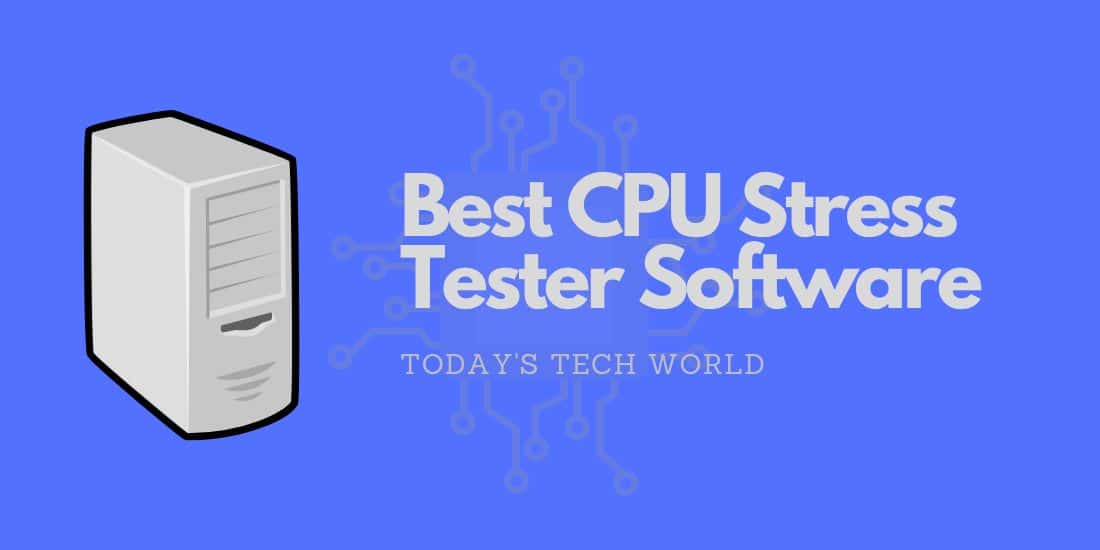CPU stress tester software or CPU stresser is an essential tool for computer enthusiasts, system administrators, and hardware manufacturers. These applications help assess the performance, stability, and cooling capabilities of a computer’s central processing unit (CPU).
Common problems with aging computers include regular slowdowns, unexpected functional inconsistencies, and abrupt system shutdowns. It’s crucial not to overlook these indicators, as persistent occurrences could potentially result in irreversible damage to your computer.
The best course of action in such scenarios should be to use a CPU Stresser to test the potential of your computer.
In this article, we will explore what CPU stressers or CPU stress testers are and list the ten best CPU stress tester software available in the market.
Contents
What is a CPU Stresser (or CPU Stress Tester)?
A CPU stresser, also known as a CPU stress test or CPU stress tester, is a software tool designed to push a computer’s CPU to its limits.
By placing the CPU under maximum load, these tests can identify potential issues, such as instability, overheating, or insufficient cooling.
Stress tests are beneficial for overclocking enthusiasts who wish to boost their CPU’s clock speed beyond the manufacturer’s specifications, as it helps ensure the system remains stable under extreme conditions.
Are IP Stresser and CPU Stresser same?
In one of our previous articles, we discussed what is IP Stresser and also the best IP stressers to use to test your organization’s infrastructure. You must be wondering if IP stressers and CPU Stress tests are the same. Here is the answer –
No, the IP stresser and CPU stresser are not the same. An IP stresser is a tool or service used to launch Distributed Denial of Service (DDoS) attacks against a target’s IP address, overwhelming it with a large volume of traffic and causing it to become inaccessible. Sometimes it gets used to test the infrastructure of an organization if that can handle a particular amount if requests or traffic.
On the other hand, a CPU stresser is a software tool designed to put a computer’s CPU under heavy load to test its stability, performance, or cooling system. It is often used for stress testing and benchmarking purposes.
Both stressers serve different purposes, with the IP stresser being malicious and used for harmful activities, while the CPU stresser is a legitimate tool used for testing hardware performance. It’s essential to use such tools responsibly and only with proper authorization.
Now that we have a fair idea about CPU Stress testers let’s discuss about top 10 CPU Stress testers available in 2023.
Also Read: 12 Best Sites Like IceFilms to Watch Movies and TV Shows Free Online
Top 10 CPU Stress Tester Software
1. Prime95

One of the most popular CPU stress testers, Prime95, is primarily used for stability testing and overclocking. It runs complex mathematical calculations, fully utilizing the CPU’s capabilities.
Prime95 extensively utilizes both integer and floating-point instructions of the processor, hence it provides a steady and provable workload to assess the stability of both the CPU itself and the L1/L2/L3 processor cache.
Furthermore, it effectively engages all the cores within a multi-CPU / multi-core system, creating a demanding stress test environment.
2. AIDA64 Extreme

AIDA64 Extreme is a comprehensive system of diagnostic and CPU stress testing (torture testing) software. It provides in-depth information about hardware and performs CPU stress tests with various workloads.
AIDA64 is compatible with operating systems such as Windows, Android, iOS, Windows Phone, Tizen, ChromeOS, and Sailfish OS.
If you are looking for comprehensive insights into a computer’s components then you should definitely try AIDA64.
3. IntelBurnTest

IntelBurnTest is a free and official utility software offered by Intel that is used to stress test the processor (CPU) in a computer.
This CPU stress testing tool is optimized for Intel processors. It puts a heavy load on the CPU to identify potential stability issues quickly.
This CPU street test software is heavily used by custom CPU assemblers and hardware enthusiasts.
4. OCCT (OverClock Checking Tool)

OCCT stress test software enables you to assess and enhance the performance of your system’s parts. OCCT stands out as the most widely used comprehensive tool for evaluating stability and conducting CPU stress tests.
It produces substantial workloads on your CPU components, simultaneously examining for any errors, and is exceptionally adept at identifying stability concerns more rapidly than alternative options. OCCT seamlessly incorporates HwInfo’s monitoring mechanism, ensuring accurate measurements and expedited issue diagnosis.
OCCT is designed to stress test CPU, GPU, and power supply units. Its CPU stress test uses Linpack and other workloads to verify system stability.
5. FurMark

Though primarily a GPU stress tester, FurMark’s CPU burner option can be used to exert stress on the CPU alongside the GPU, providing comprehensive system testing.
FurMark by complexity is a lightweight yet highly demanding CPU stress test software for the Windows platform. It serves as a rapid OpenGL benchmark with the ability to generate online scores.
While FurMark is considered safe, insufficient cooling or inadequate power supply management, such as the VRMs, can potentially lead to GPU damage when using FurMark.
However, this is probably the case with all the CPU stresses available. So you should keep the arrangement of a good cooler in order to do CPU potential testing.
6. Linpack Xtreme

Linpack Xtreme is a benchmarking and CPU stress testing tool that uses the Linpack library. It is known for its ability to push CPU and memory systems to their limits.
If you are a CPU Geeks, the good news is that Linpack Xtreme encompasses a console front-end integrated with the most recent iteration of Linpack, utilizing the Intel Math Kernel Library Benchmarks 2018.3.011 for robust performance evaluation.
7. RealBench

RealBench is another one of the best benchmarking utilities that includes a CPU stress test component. The best quality of RealBench is that it focuses on real-world scenarios, making it a reliable indicator of system performance.
RealBench employs genuine open-source applications to assess your PC’s performance under real-world conditions, simulating its actual usage. While it can offer a competitive assessment, its primary intent isn’t to be excessively rigorous or time-intensive; rather, it aims to serve as an inclusive benchmark suitable for a wide range of users.
8. HeavyLoad

HeavyLoad is a versatile stress-testing software that puts significant strain on the CPU, memory, and other system components. It also monitors system parameters during the test.
During CPU stress test operation, HeavyLoad provides the capability to monitor your GPU temperature and also lets you observe how your computer performs under stress.
9. Cinebench

One of the best CPU stresser, Cinebench is a versatile cross-platform test suite that facilitates easy determination of your PC’s capabilities through advanced rendering and CPU technology.
Cinebench also serves as a valuable tool for system administrators making purchase choices, journalists conducting hardware reviews, and hardware manufacturers refining their offerings.
It’s particularly useful in assessing next-gen CPUs and gauging the adequacy of cooling solutions for notebooks and desktops.
This tool is available for both Windows and Apple’s M1-based computing systems. However, it is not compatible with all OS versions. It works fine with Windows 10 on 64-bit AMD or Intel CPUs with SSE3 support and 4 GB of RAM. In the case of Apple devices, macOS 10.13.6 or higher is required, along with a 64-bit CPU on either Intel-based or M1 Mac systems, and a minimum of 4 GB of RAM.
10. GIMPS (Great Internet Mersenne Prime Search)

As the name suggests Great Internet Mersenne Prime Search is a collaboration that uses freely available software to search for Mersenne prime numbers.
However, our discussion here is limited to the CPU stress tester software. GIMPS is used for efficient testing of PC hardware across Mac OS X, Windows, Linux, or FreeBSD platforms, yielding PRP results and negating the need for redundant verification.
Depending on your system, you can easily access suitable, free software to initiate CPU stress testing on your PC, without complications. This software is accessible in both 32-bit and 64-bit versions for a variety of operating systems.
GIMPS efficiently leverages all cores within a multi-core or multi-CPU system, ensuring hardware stability even under high-load stress conditions. It can also be instrumental in troubleshooting unexplained system crashes in a newly acquired PC.
Final Thoughts
CPU stress tester software plays a vital role in ensuring a computer’s stability, performance, and cooling efficiency. Whether you are an overclocking enthusiast, system builder, or simply curious about your system’s capabilities, using one of the top 10 CPU stress testers mentioned in this article will help you evaluate your CPU’s performance under extreme conditions.
However, always exercise caution and avoid running stress tests for extended periods to prevent potential damage to your hardware.




